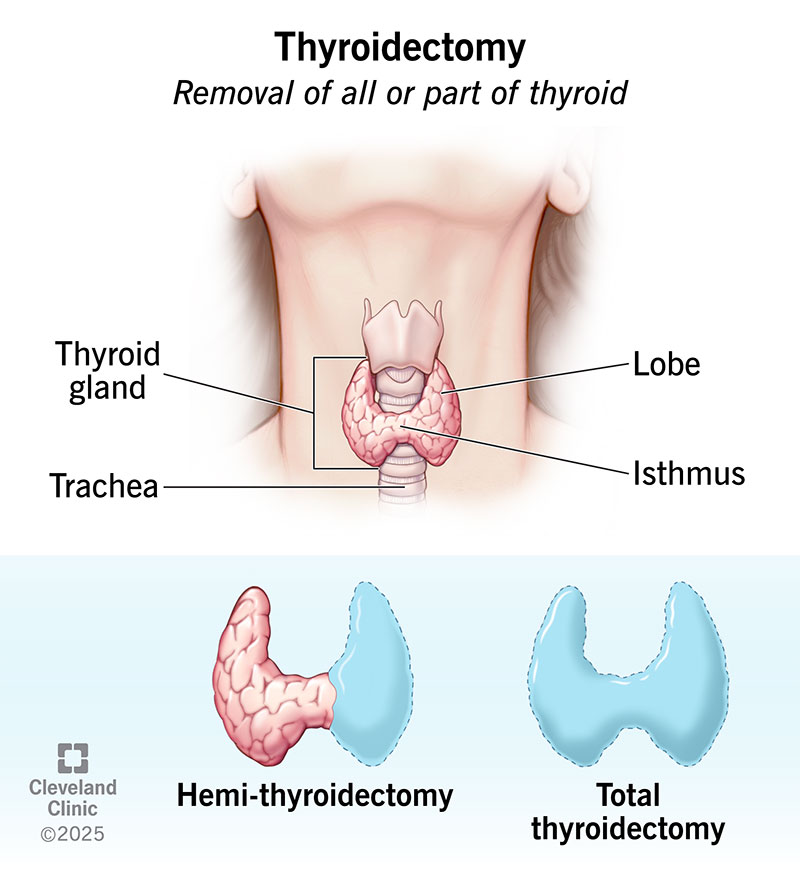Thyroidectomy is surgery to remove all or part of your thyroid gland. Surgeons perform thyroidectomies to remove goiters and thyroid nodules, and to treat thyroid cancer.
Advertisement
Cleveland Clinic is a non-profit academic medical center. Advertising on our site helps support our mission. We do not endorse non-Cleveland Clinic products or services. Policy

Image content: This image is available to view online.
View image online (https://my.clevelandclinic.org/-/scassets/images/org/health/articles/7016-thyroidectomy)
A thyroidectomy is a surgery to remove all (total thyroidectomy) or part (partial thyroidectomy) of your thyroid gland — a butterfly-shaped organ in your neck.
Advertisement
Cleveland Clinic is a non-profit academic medical center. Advertising on our site helps support our mission. We do not endorse non-Cleveland Clinic products or services. Policy
Thyroidectomy is a surgical treatment for thyroid cancer and certain thyroid conditions, including:
There are two main types of thyroidectomies: total and partial.
The type of thyroidectomy you need depends on the reason for the surgery. You, your endocrinologist and your surgeon will determine the best surgery plan for you.
Your healthcare provider may recommend thyroidectomy for any of the following reasons:
Advertisement
If your endocrinologist recommends thyroidectomy, it may be helpful to ask your endocrinologist and/or surgeon the following questions:
Your endocrinologist and surgeon will give you specific instructions to prepare for your thyroidectomy.
Depending on your reason for needing a thyroidectomy, in the weeks before your procedure:
At least one week before surgery:
You’ll need to fast (not eat or drink anything except water) for several hours before your procedure. Your provider will give you specific instructions about fasting.
Before your surgery, an anesthesiologist will give you general anesthesia to relax your muscles, prevent pain and make you fall asleep. Your healthcare team will also place a breathing tube down your throat for the procedure.
Your surgeon can access your thyroid a few ways:
Advertisement
During surgery for a thyroid cancer diagnosis, your surgeon may sample the lymph nodes around your thyroid gland. A pathologist will check the lymph node sample during surgery for evidence of thyroid cancer. If they find cancerous cells, your surgeon may also remove nearby lymph nodes in your neck.
Once your surgeon is done, they’ll close the incision with dissolvable stitches and place glue over the skin.
Surgery to remove your whole thyroid typically takes one to three hours. It may take less time if your surgeon removes only part of your thyroid.
A thyroidectomy is generally very safe, but it’s a major surgery. Complications are uncommon, but the possible risks of thyroidectomy include:
While these complications are rare, they’re more likely to happen if:
Advertisement
Once you recover from anesthesia and are fully awake, you’ll be able to have something light to eat and drink. You’ll likely spend the night in the hospital so your healthcare provider can monitor you.
Your throat may be sore due to the breathing tube your healthcare team placed during the surgery.
You may need to take daily thyroid hormone (levothyroxine) pills to replace the lost thyroid hormone your thyroid naturally made. Your healthcare provider will discuss this with you before surgery. If your entire thyroid is removed, your surgeon will likely prescribe oral calcium supplements for several weeks to prevent low blood calcium levels.
Before you go home, your provider will give you instructions on how to care for your incision. They’ll let you know the types of complications to look out for in the coming days. It should take about two to three weeks for you to fully recover. You should wait at least one to two weeks before returning to vigorous activities, like exercising and heavy lifting.
You’ll most likely have a small scar on the front of your neck after the surgery. Most scars are between 1 inch and 2.5 inches long. The exact size depends on how large your thyroid was. The scar can take between 12 and 18 months to heal. It will start out as dark, then gradually lighten. It may also be raised or appear puffy for several months before smoothing out. Your surgeon can give you specific instructions on how to care for your scar.
Advertisement
Call your healthcare provider if you experience any of the following after a thyroidectomy:
Having any procedure can feel overwhelming. It’s normal to feel nervous or uncertain. Thyroid surgery is a common and safe procedure. Many people recover well and feel much better after — especially if the procedure was to remove cancerous cells. If you have any questions or concerns, don’t hesitate to talk to your endocrinologist or surgeon. They’re there to support you and answer your questions.
Learn more about the Health Library and our editorial process.
Cleveland Clinic's health articles are based on evidence-backed information and review by medical professionals to ensure accuracy, reliability, and up-to-date clinical standards.
Cleveland Clinic's health articles are based on evidence-backed information and review by medical professionals to ensure accuracy, reliability, and up-to-date clinical standards.
Cleveland Clinic’s experienced healthcare providers treat all kinds of thyroid disorders, including issues that cause hypothyroidism and hyperthyroidism.
